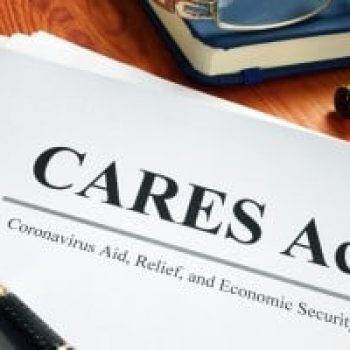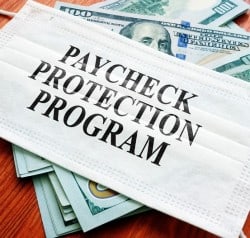BLUF –Secular nonprofits are subject to standard SBA affiliation rules under 13 CFR 121.301(f); faith-based organizations are largely exempt from those rules.
INTRODUCTION
As the Small Business Administration (SBA) and the Department of the Treasury roll out their emergency relief programs under the Coronavirus Aid, Relief, and Economic Security Act (CARES Act), guidance related to those programs is still being finalized. The Payroll Protection Program (PPP) is open to more organizations than are typically permitted to participate in SBA loan programs, as nonprofits and faith-based organizations are not normally permissible recipients of SBA loans, which is what prompted the SBA to issue an interim final rule interpreting its affiliation rules for these new recipients.
Under the SBA’s affiliation rules, a small business must take into account employees of any affiliate entities in determining whether it qualifies for the SBA loan programs, which generally require qualifying organizations to have less than 500 employees. Determining whether an affiliation exists between entities is primarily a facts and circumstances analysis. SBA decided to treat secular nonprofits to the same affiliation rules as most other applicants, while faith-based organizations that are affiliated with other faith-based organizations can generally claim an exemption from the affiliation rules.
NONPROFITS
The CARES Act, while expanding eligibility to nonprofits, also subjects nonprofits to existing affiliation rules. Those rules are described in the Code of Federal Regulations at 13 CFR 121.301(f). While these rules are designed to apply to for-profit companies, many of the principles are transferable to nonprofits.
When considering how the affiliation rules apply, nonprofit leaders should think about the degree of control and commonality between two or more entities. The regulations provide a number of different ways to think about affiliation. For instance, it is not enough to consider whether one entity actually controls another, but whether it has the right and power to do so. Overlapping management or boards can also create affiliation, even where one entity doesn’t have the express right to control another.
One indicia of affiliation is when two organizations contract with one another but their dealings are not at arms-length – perhaps a transaction’s terms are more friendly to one entity than they would otherwise find in the market due to the organizations’ close connection. In determining affiliation, the SBA considers all facts and circumstances, but will not overturn the determination of a lender, so long as the lender’s determination was reasonable.
Let’s look at some examples of affiliation in the nonprofit context. If a nonprofit and another organization have overlapping boards where a majority of one board is comprised of members of the other organization’s board, the organizations could be considered affiliated under the SBA’s rules. Similarly, if a nonprofit uses a sole member structure that allows another organization, acting as the sole member, to appoint and remove directors on the nonprofit’s board, block actions by the nonprofit’s board of directors, or otherwise control the nonprofit, the organizations could be considered affiliated under the SBA’s rules.
Even if the boards of the two organizations are entirely separate, if two organizations share overlapping management such that the same executive staff runs both organizations, the organizations could be considered affiliated. Affiliation can also arise where one organization is economically dependent on the other, which the SBA’s regulations define as receiving over 85% of an organization’s receipts over the previous three fiscal years from a contractual relationship with another organization.
FAITH-BASED ORGANIZATIONS
While the SBA has generally applied its existing affiliation rules to most nonprofits, the agency has taken a different approach to faith-based organizations (FBOs). SBA determined that the Religious Freedom Restoration Act (RFRA) requires the SBA to exempt faith-based organizations from affiliation rules[1] when such affiliation is part of the FBO’s exercise of religion. The SBA stated that it will not apply its regulations in a way that imposes substantial burdens on the religious exercise of faith-based loan recipients, unless such application is the least restrictive means of furthering a compelling governmental interest.
According to the SBA guidance, if an affiliation between an FBO and another entity is based on a religious teaching or belief or is otherwise a part of the exercise of religion, the organization will qualify for an exemption from the SBA affiliation rules. The SBA allows each faith-based organization to make its own good-faith determination related to its affiliation to any other organization, and has stated that it “will not assess, and will not permit participating lenders to assess, the reasonableness of the faith-based organization’s good-faith determination that this exception applies.”
The SBA provided the following sample language for FBOs to include in an application to a lender for purposes of claiming exemption from the affiliation rules:
“The Applicant claims an exemption from all SBA affiliation rules applicable to Paycheck Protection Program loan eligibility because the Applicant has made a reasonable, good faith determination that the Applicant qualifies for a religious exemption under 13 C.F.R. 121.103(b)(10), which says that “[t]he relationship of a faith-based organization to another organization is not considered an affiliation with the other organization . . . if the relationship is based on a religious teaching or belief or otherwise constitutes a part of the exercise of religion.”
CONCLUSION
Standard SBA affiliation rules apply to nonprofits, except that faith-based organizations whose affiliations are part of the exercise of their religion are exempt from affiliation rules for purposes of PPP. We do caution, however, that the rules issued by SBA are subject to change. If you have any question about how to apply to SBA’s affiliation rules to your organization, please reach out to us.
[1] The RFRA generally prohibits the federal government from imposing a substantial burden on a person’s exercise of religion except in furtherance of a compelling government interest by the least restrictive means available.
- Perlman & Perlmanhttps://perlmanandperlman.com/author/nancyisrael/
- Perlman & Perlmanhttps://perlmanandperlman.com/author/nancyisrael/
- Perlman & Perlmanhttps://perlmanandperlman.com/author/nancyisrael/
- Perlman & Perlmanhttps://perlmanandperlman.com/author/nancyisrael/










